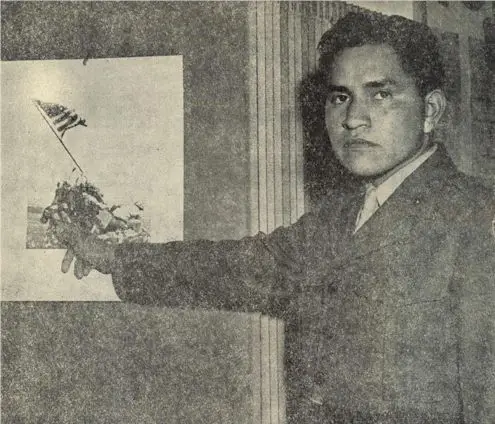
Many Indians participated in the famous action on Iwo Jima. The most celebrated of these is Pfc. Ira H. Hayes, a full-blood Pima from Bapchule, Arizona, one of three survivors of the historic incident on Mount Suribachi, when six Marines raised the flag on the summit of the volcano, under heavy enemy fire. He served on Iwo Jima for 36 days and came away unwounded. Previously he had fought at Vella La Vella and Bougainville. Because of the nation-wide attention won by Rosenthal’s dramatic photograph of the flag-raising, symbol and expression of the invincible American spirit, Hayes and his two comrades, Pharmacist’s Mate John Bradley and Pfc. Rene A. Gagnon, were brought back to this country to travel extensively in support of the Seventh War Loan. In the photograph on the opposite page, Hayes is pointing out his position in the flag-raising patrol.
On May 1st, more than 1000 Indians of the Pima tribe gathered at Bapchule to pay honor to their fellow tribesman and to celebrate his safe return. A barbecue feast, under a canopy of brush, was followed by an impressive religious ceremony, with prayers led by Protestant and Catholic missionaries and song by several church choirs. Mrs. Hayes, Ira’s mother, asked two of the girl soloists to sing the hymn, “He Will Deliver.”
The National Congress of American Indians gave a luncheon in honor of Hayes and his comrades in Chicago On May 19, at which a brief speech by Hayes was broadcast. At this meeting he was made first commander of the American Indian Veterans’ Association. Pharmacist’s Mate Bradley stated in an interview that Hayes was “a marked man on the island because of his cool level-headedness and efficiency.” He refused to be leader of a platoon, according to Bradley, because, as he explained, “I’d have to tell other men to go and get killed, and I’d rather do it myself.” When he and the two others were ordered home to take part in the War Loan campaign, Hayes was reluctant to leave his fighting comrades, and, after a few weeks in the United States, requested that he be returned to overseas duty, where he felt he would be of greater value to his country.
A second Indian, Louis C. Charlo, Flathead, from Montana, climbed Mount Suribachi with a Marine patrol shortly after the flag was raised on its summit. He was killed in action not long afterward, fighting to keep the Stars and Stripes on the mountain. Louis was the grandson of Chief Charlo of Nez Perce war fame, a leader who maintained his friendship with the white people throughout those trying times.
Among Indians listed as wounded on the island as Pfc. Ray Flood, Sioux, from Pine Ridge; Verne Ponzo, Shoshone, Fort Hall; Oreville Gass, Sidney Brown, Jr. and Richard J. Brown, Blackfeet, Robert Spahe, Jicarilla Apache; Thomas Chapman, Jr., Pawnee, and William M. Fletcher, Cheyenne, from Oklahoma; Joseph R. Johnson, Papago, Arizona; Pfc. Glenn Wasson and Pfc. Clarence L. Chavez, Paiute, Nevada; and Richard Burson, Ute, from Utah. Killed were Pvt. Howard Brandon, Rosebud Sioux; Pfc. Clement Crazy Thunder, Pine Ridge Sioux, whose photograph appeared in the May-June 1943 issue of Indians at Work; Pfc. Adam West Driver, Cherokee, from North Carolina; Pvt. Eugene Lewis, Yurok, California; and Paul Kinlahcheeny, Navajo. Leland Chavez, S 1-c, Paiute, Nevada, is reported missing in action.
Sgt. Warren Sankey, Arapaho, from El Rena, Oklahoma, was one of the crew which first knocked out a Japanese tank on Iwo Jima.
Two Flathead Indian brothers, Daniel and John Moss, Marines from Arlee, Montana, met unexpectedly on Iwo Jima, and both came safely through the fighting. Their father, Henry Mass, served with the Marines in the First World War.
One of four survivors of his company is Pvt. Clifford Chebahtah, Comanche, of Anadarko, Oklahoma. Pvt. Chebahtah was injured on Iwo Jima and was granted a two weeks’ furlough at home.
“I was lying in a foxhole when I saw our boys raise the flag on the top of the volcanic mountain of Suribachi, and cold shivers ran down my spine,” he said.
